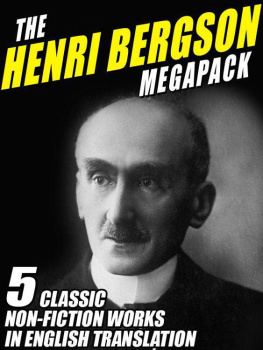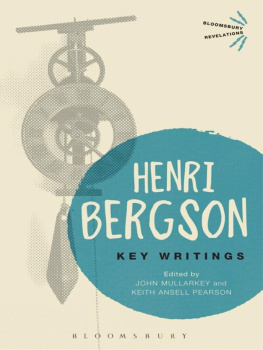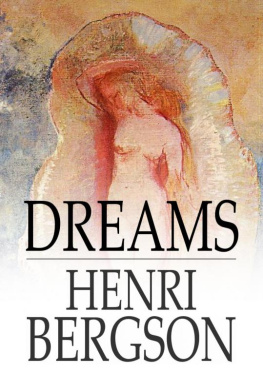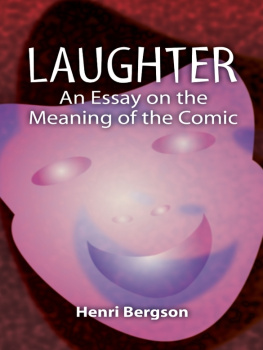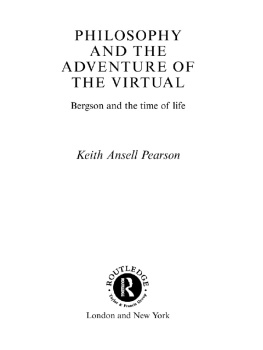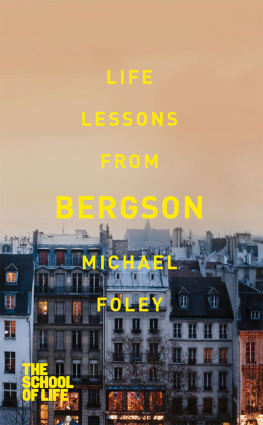Henri Bergson - Creative Evolution
Here you can read online Henri Bergson - Creative Evolution full text of the book (entire story) in english for free. Download pdf and epub, get meaning, cover and reviews about this ebook. year: 2008, genre: Science. Description of the work, (preface) as well as reviews are available. Best literature library LitArk.com created for fans of good reading and offers a wide selection of genres:
Romance novel
Science fiction
Adventure
Detective
Science
History
Home and family
Prose
Art
Politics
Computer
Non-fiction
Religion
Business
Children
Humor
Choose a favorite category and find really read worthwhile books. Enjoy immersion in the world of imagination, feel the emotions of the characters or learn something new for yourself, make an fascinating discovery.
- Book:Creative Evolution
- Author:
- Genre:
- Year:2008
- Rating:4 / 5
- Favourites:Add to favourites
- Your mark:
- 80
- 1
- 2
- 3
- 4
- 5
Creative Evolution: summary, description and annotation
We offer to read an annotation, description, summary or preface (depends on what the author of the book "Creative Evolution" wrote himself). If you haven't found the necessary information about the book — write in the comments, we will try to find it.
Creative Evolution — read online for free the complete book (whole text) full work
Below is the text of the book, divided by pages. System saving the place of the last page read, allows you to conveniently read the book "Creative Evolution" online for free, without having to search again every time where you left off. Put a bookmark, and you can go to the page where you finished reading at any time.
Font size:
Interval:
Bookmark:
The Project Gutenberg EBook of Creative Evolution, by Henri Bergson
This eBook is for the use of anyone anywhere at no cost and with
almost no restrictions whatsoever. You may copy it, give it away or
re-use it under the terms of the Project Gutenberg License included
with this eBook or online at www.gutenberg.org
Title: Creative Evolution
Author: Henri Bergson
Translator: Arthur Mitchell
Release Date: August 1, 2008 [EBook #26163]
Language: English
*** START OF THIS PROJECT GUTENBERG EBOOK CREATIVE EVOLUTION ***
Produced by Rick Niles, Graeme Mackreth and the Online
Distributed Proofreading Team at http://www.pgdp.net
Transcibers note..The greek contained herein has been transcribed as faithfully as browser limitations allow.
NEW YORK HENRY HOLT AND COMPANY 1911
Copyright , 1911,
by
HENRY HOLT AND COMPANY
CAMELOT PRESS, 18-20 OAK STREET, NEW YORK
In the writing of this English translation of Professor Bergson's most important work, I was helped by the friendly interest of Professor William James, to whom I owe the illumination of much that was dark to me as well as the happy rendering of certain words and phrases for which an English equivalent was difficult to find. His sympathetic appreciation of Professor Bergson's thought is well known, and he has expressed his admiration for it in one of the chapters of A Pluralistic Universe. It was his intention, had he lived to see the completion of this translation, himself to introduce it to English readers in a prefatory note.
I wish to thank my friend, Dr. George Clarke Cox, for many valuable suggestions.
I have endeavored to follow the text as closely as possible, and at the same time to preserve the living union of diction and thought. Professor Bergson has himself carefully revised the whole work. We both of us wish to acknowledge the great assistance of Miss Millicent Murby. She has kindly studied the translation phrase by phrase, weighing each word, and her revision has resulted in many improvements.
But above all we must express our acknowledgment to Mr. H. Wildon Carr, the Honorary Secretary of the Aristotelian Society of London, and the writer of several studies of "Evolution Creatrice."[1] We asked him to be kind enough to revise the proofs of our work. He has done much more than revise them: they have come from his hands with his personal mark in many places. We cannot express all that the present work owes to him.
ARTHUR MITCHELL
Harvard University
| PAGE |
| The Evolution of LifeMechanism and Teleology |
| Of duration in generalUnorganized bodies and abstract timeOrganized bodies and real durationIndividuality and the process of growing old |
| Of transformism and the different ways of interpreting itRadical mechanism and real duration: the relation of biology to physics and chemistryRadical finalism and real duration: the relation of biology to philosophy |
| The quest of a criterionExamination of the various theories with regard to a particular exampleDarwin and insensible variationDe Vries and sudden variationEimer and orthogenesisNeo-Lamarckism and the hereditability of acquired characters |
| Result of the inquiryThe vital impetus |
| The Divergent Directions of the Evolution of LifeTorpor, Intelligence, Instinct |
| General idea of the evolutionary processGrowthDivergent and complementary tendenciesThe meaning of progress and of adaptation |
| The relation of the animal to the plantGeneral tendency of animal lifeThe development of animal life |
| The main directions of the evolution of life: torpor, intelligence, instinct |
| The nature of the intellect |
| The nature of instinct |
| Life and consciousnessThe apparent place of man in nature |
| On the Meaning of LifeThe Order of Nature and the Form of Intelligence |
| Relation of the problem of life to the problem of knowledgeThe method of philosophyApparent vicious circle of the method proposedReal vicious circle of the opposite method |
| Simultaneous genesis of matter and intelligenceGeometry inherent in matterGeometrical tendency of the intellectGeometry and deductionGeometry and inductionPhysical laws |
| Sketch of a theory of knowledge based on the analysis of the idea of DisorderTwo opposed forms of order: the problem of genera and the problem of lawsThe idea of "disorder" an oscillation of the intellect between the two kinds of order |
| Creation and evolutionIdeal genesis of matterThe origin and function of lifeThe essential and the accidental in the vital process and in the evolutionary movementMankindThe life of the body and the life of the spirit |
| The Cinematographical Mechanism of Thought and the Mechanistic IllusionA Glance at the History of SystemsReal Becoming and False Evolutionism |
| Sketch of a criticism of philosophical systems, based on the analysis of the idea of Immutability and of the idea of "Nothing"Relation of metaphysical problems to the idea of "Nothing"Real meaning of this idea |
| Form and Becoming |
| The philosophy of Forms and its conception of BecomingPlato and AristotleThe natural trend of the intellect |
| Becoming in modern science: two views of Time |
| The metaphysical interpretation of modern science: Descartes, Spinoza, Leibniz |
| The Criticism of Kant |
| The evolutionism of Spencer |
The history of the evolution of life, incomplete as it yet is, already reveals to us how the intellect has been formed, by an uninterrupted progress, along a line which ascends through the vertebrate series up to man. It shows us in the faculty of understanding an appendage of the faculty of acting, a more and more precise, more and more complex and supple adaptation of the consciousness of living beings to the conditions of existence that are made for them. Hence should result this consequence that our intellect, in the narrow sense of the word, is intended to secure the perfect fitting of our body to its environment, to represent the relations of external things among themselvesin short, to think matter. Such will indeed be one of the conclusions of the present essay. We shall see that the human intellect feels at home among inanimate objects, more especially among solids, where our action finds its fulcrum and our industry its tools; that our concepts have been formed on the model of solids; that our logic is, pre-eminently, the logic of solids; that, consequently, our intellect triumphs in geometry, wherein is revealed the kinship of logical thought with unorganized matter, and where the intellect has only to follow its natural movement, after the lightest possible contact with experience, in order to go from discovery to discovery, sure that experience is following behind it and will justify it invariably.
But from this it must also follow that our thought, in its purely logical form, is incapable of presenting the true nature of life, the full meaning of the evolutionary movement. Created by life, in definite circumstances, to act on definite things, how can it embrace life, of which it is only an emanation or an aspect? Deposited by the evolutionary movement in the course of its way, how can it be applied to the evolutionary movement itself? As well contend that the part is equal to the whole, that the effect can reabsorb its cause, or that the pebble left on the beach displays the form of the wave that brought it there. In fact, we do indeed feel that not one of the categories of our thoughtunity, multiplicity, mechanical causality, intelligent finality, etc.applies exactly to the things of life: who can say where individuality begins and ends, whether the living being is one or many, whether it is the cells which associate themselves into the organism or the organism which dissociates itself into cells? In vain we force the living into this or that one of our molds. All the molds crack. They are too narrow, above all too rigid, for what we try to put into them. Our reasoning, so sure of itself among things inert, feels ill at ease on this new ground. It would be difficult to cite a biological discovery due to pure reasoning. And most often, when experience has finally shown us how life goes to work to obtain a certain result, we find its way of working is just that of which we should never have thought.
Font size:
Interval:
Bookmark:
Similar books «Creative Evolution»
Look at similar books to Creative Evolution. We have selected literature similar in name and meaning in the hope of providing readers with more options to find new, interesting, not yet read works.
Discussion, reviews of the book Creative Evolution and just readers' own opinions. Leave your comments, write what you think about the work, its meaning or the main characters. Specify what exactly you liked and what you didn't like, and why you think so.


